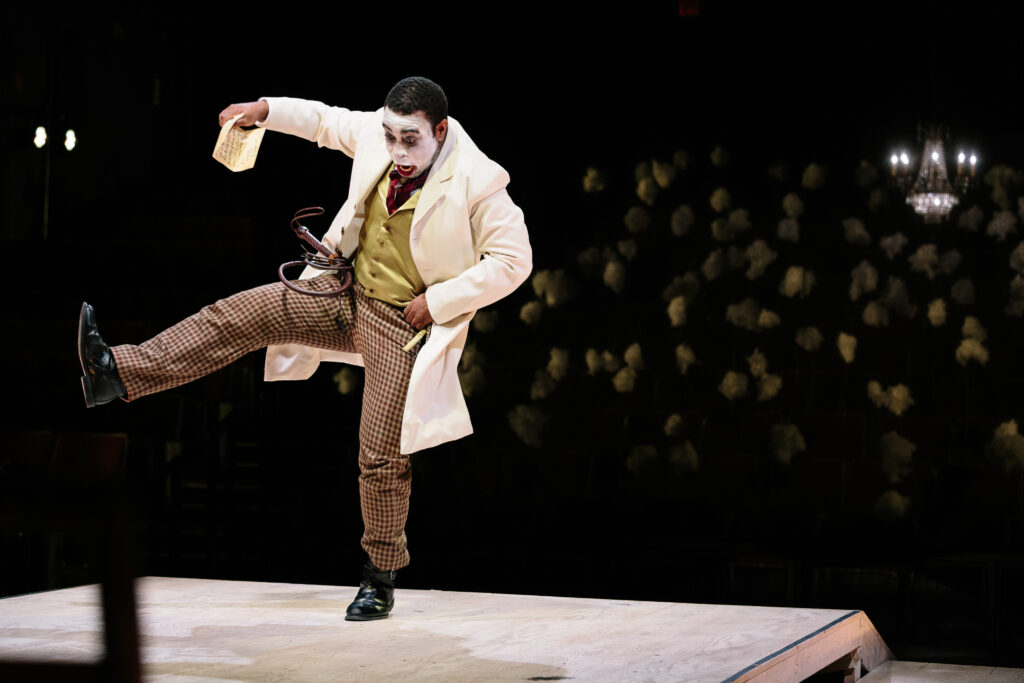
It’s deep in the second act when the purpose of the painful scenes and demeaning words becomes clear; as one actor says, “The point of this whole thing is to make you feel something.”
The actor is referring to a scene in An Octoroon, on stage now at The Gamm Theatre, in which a Native American is wrongly accused by an angry mob of a murder. Moments earlier, the stage held large televisions showing footage from the January 6, 2021 White House insurrection. This is the fast-paced mix Director Joe Wilson Jr. creates to push the powerful messages in Branden Jacobs-Jenkins’ play.
Jacobs-Jenkins reworked a 19th-century play by Irish playwright Dion Boucicault, deconstructing the piece into an overly, yet masterfully melodramatic look at slavery. He’s placed himself, as the unnamed Black playwright, and Boucicault into the two-hour piece for dramatic effect and to add power to his messages.
In Wilson’s hands, An Octoroon explodes like a steamboat loaded with fresh cotton and poorly stored kerosene. Before anyone even sets foot on the catwalk stage, painful, yet necessary, messages unfurl. The two televisions are set up for the audience, running through a range of disparaging cartoons and news footage from Ku Klux Klan marches to “Song of the South” to Bugs Bunny in blackface. It is immediately clear – as rappers Mary J. Blige and others pump through the speakers – that this show plans to pack a punch.
The largely white audience (when I attended) follows the story of George, who returns from Paris to save his uncle’s failing plantation. George falls in love with his uncle’s illegitimate child, called an octoroon because she is one eighth black, and finds himself battling the evil overseer, M’Closky, for woman and plantation.
In Boucicault’s day, Black actors were not allowed on stage so white actors would don blackface to play them. Jacobs-Jenkins continues this in “An Octoroon,” with Black actors donning whiteface and white actors wearing black or redface. The message is unspoken yet no less impactful.
This happens against the backdrop of melodrama, which Wilson exploits expertly through his actors. Jason Quinn, for example, portrays Pete, a slave with such extreme gestures and overdone submission that he is pure farce. His white gloved hands outstretched, Quinn is minstrel-like while chastising the house staff or pandering to George.
Alison Russo, as the daughter of a nearby plantation owner who vies for George’s affection, is also gifted with stylized melodramatic delivery. While Russo’s most fascinating transformation is into the steamboat captain who comes ashore to bid on slaves when the plantation goes up for auction – complete with corset and hoop shirt, a hand-held moustache and manly slouch her only differentiating elements – she plays the audience well with both delivery and mannerisms.
This is a well-chosen and beautifully coached cast. Michelle Walker swings from sassy slave to street-smart punk, playing nicely with Jackie Davis’ meeker Dido. Shelley Fort’s portrayal of Zoe, the octoroon, is heart-wrenching in its soulfulness. She is torn between two worlds and when her existence is threatened, Fort pumps in just the right amount of emotion to tug the audience’s heartstrings.
But, Marc Pierre as the Black playwright, and alternately George and M’Closkey, and Jeff Church as Boucicault and the Native American Wahnotee, drive the brilliance. In one scene, George and M’Closkey get into a physical altercation. As challenging and potentially corny as that sounds, Pierre rolls on the stage, shifting from one personality to the other believably. In another scene, he fights as M’Closkey with Church’s Wahnotee in an equally realistic and powerful few moments.
It was a solid and strong choice by Wilson to infuse this show with the insurrection footage, as well as clips of former President Donald Trump. This is not only a reflection of the dark days of slavery, but the current days of hatred and unrest. In ending the show with “What a Wonderful World,” though, the director’s message is hope, inspiration and power.
An Octoroon is on stage through Feb 20. For more information, go to www.gammtheatre.org.